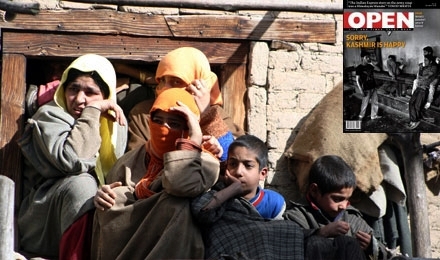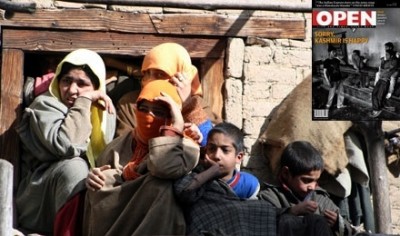Pritha Kejriwal (Editor-in-Chief, Kindle Magazine)
Oscar Wilde had once said that journalism is unreadable…I wouldn’t go into the merits of the sweeping statement, but it just so happens, that at times, one comes across instances of journalism, so grotesque, so misshapen, so utterly despicable, that one can’t but not agree…
‘Sorry, Kashmir is happy’ (Cover story, Open Magazine, 21 April 2012 by Manu Joseph) is one such apology for journalism, which makes me wonder, how on earth, did one become so delusional, so as to pass a judgement on an entire people’s state of mind, so as to make a pulp out of their past, present and future and sieve it through their utterly myopic vision and print it in bold yellow letters on their pompous publication, thinking they are the only ones, who can tell a story, as it should be told…well, I hate to say this, but one wouldn’t even throw a penny at such puny journalism, or at the lowly comedian who seems to be masquerading as a journalist.
We have been served lies by most media for a very long time now, but such shallow, easy and vulgar striking off, of decades of struggle, memory, pain, tears, songs and slogans of protest and replacing them with Café coffee day and KFC chatter, labeling people who have bled and cried and sang for a cause as “melancholy poets, facebook revolutionaries and a rapper who owns a hood”, ignoring decades of human rights violence which continues, Indian military exploits which continue, terror victims which continue to pile up and to paint a seemingly happy picture, is not just blatant falsification, but utter stupidity.
And even though its true, that Kashmir’s status as a conflict zone, has spun an industry of writers, seminar tourists, cause peddlers around it, it doesn’t negate the problems of the state, which continue to persist and haunt its people every single day. The fact that, for over six decades now, the Kashmiris have refused to take any sides and continue to assert their need for autonomy, and have prepared themselves for any eventuality, should be testament enough to the fact that we require new imaginations to deal with the continued crisis, rather than brushing an entire people and their sacrifices under the carpet.
And if all these arguments sound like the echoes bouncing off the walls of some old heritage building, let me also make some arguments, sitting at this mental health camp in Srinagar, set up by the state hospital’s department of psychiatry. Men, women and children of all ages have come pouring in, for an entire day…blank eyes, tearful eyes, angry eyes have narrated many stories, and almost half of them are suffering because of the onslaught of cell phones, (this particular article partly seemed to be advertising for Aircel), breaking up of families, breaking down of tradition, cultural alienation, loneliness and other such effects of globalization. The department’s report on the average Kashmiri’s mental health would soon be ready and one would know, a little more of the truth.
And if one could actually measure happiness, well there is an index out there, which makes Bhutan, the happiest place in the world, with least number of tourists and posh coffee shops.
If only, someone could tell Mr. Joseph, who has fallen into a habit of writing mostly easy, simplified pieces for his NRI readers in New York Times, that Kashmir is a cause for which Kashmiris living in Kashmir have given their lives to, and has little to do with Kashmiris living in America, Dubai or Delhi.
Also, if someone could ask him, if electricity and roads are not about politics, then what is?
From Capitalism : a ghost story, to Kashmir: a happy story, we seem to have lost an essential narrative somewhere in between.
As Manu’s neon lights blaze on, to scare away the ghosts perhaps, Kashmiris complain, that these lights are too bright and mis-leading.
Sadly, we still have to take back Kashmir’s night first, before we wait for the true light of the morning…
As Faiz had said, “ye woh sehar to nahin…”
(This article was first published in Pratirodh)























